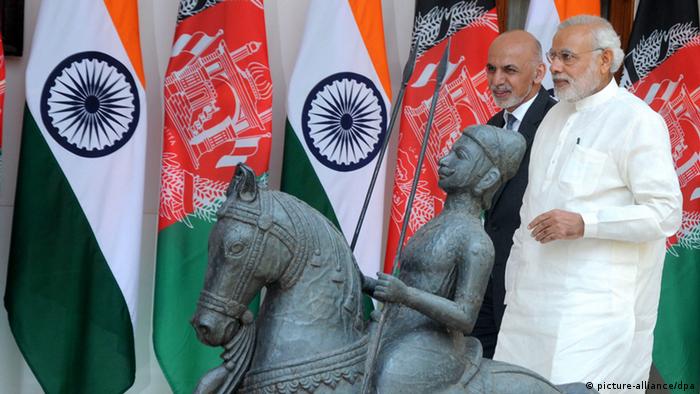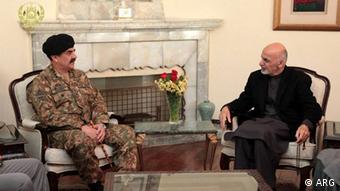Afghan leader Ashraf Ghani is on a trip to India in a bid to boost trade and reassure New Delhi of his country's commitment despite warming ties with Pakistan. But will it be enough? DW talks to analyst Smruti Pattanaik.
Indian Prime Minister, Narendra Modi (R), walks with the Afghan President, Mohammad Ashraf Ghani during their meeting in New Delhi, India, 28 April 2015
(Photo: EPA/STR)
"India and Afghanistan have (a) million ties," Ghani told reporters at a joint media briefing in the Indian capital following talks with Indian Prime Minister Narendra Modi on April 28. The Afghan president is on a three-day visit to India aimed at renewing New Delhi's commitment to Afghan development and the fight against the Taliban as well as at shoring up Indian investment in the conflict-ridden country.
New Delhi has had close ties to Kabul since the fall of the Taliban regime in 2001, especially during the term of former Afghan President Hamid Karzai. India has granted Afghanistan $2.2 billion in aid over the past decade - the biggest it has ever given to any country. However, concerns were raised in New Delhi when, shortly after his election, President Ghani decided to reach out to India's rivals Pakistan and China before visiting India.
In a DW interview, Smruti Pattanaik, a research fellow at the New Delhi-based Institute for Defense Studies and Analyses, talks about India's view of Afghanistan's warming relations with Islamabad, and explains how India can contribute to Afghanistan's economic development.
Afghanistan's President Ashraf Ghani attends a business meeting in New Delhi, India, April 29, 2015
(Photo: REUTERS/Stringer)
India's contribution to Afghanistan's economic growth is immense, says Pattanaik
DW: What are the key aims of Ghani's visit to India?
Smruti Pattanaik: Several elements of this visit are significant. First, Ghani wants to assure India that it remains an important strategic partner. Second, he wants to assure that its investment in Afghanistan is secured and would be protected from attacks by the insurgent groups. Third, Ghani is seeking more investment to accelerate the process of building the Chahbahar port in Iran.
Why has Ghani taken so long to visit India?
After the controversial electoral process that got Ghani elected as Afghan president, the main issues that have confronted his political leadership have been post-transition security challenges and talks with the Taliban aimed at concluding a negotiated political settlement that would bring lasting peace to the war torn country.
Keeping these two objectives in mind, President Ghani has sought the help of the US, Pakistan, China and Saudi Arabia. New Delhi cannot deliver on these immediate needs. However, India remains an important partner and a popular country to the people of Afghanistan. Ghani understands this and knows that India would remain a strategic challenge to Pakistan's intention to dominate Afghanistan through its proxies.
How important is Afghanistan to India?
Afghanistan forms the lynchpin of India's central Asia strategy, as it provides connectivity to these landlocked countries. Second, a peaceful Afghanistan would contribute significantly to regional peace. India does not want to see Afghanistan as a surrogate state of Pakistan. Therefore, it has laid emphasis on an Afghan-led and Afghan-owned peace process.
Third, India doesn't want Afghanistan to emerge as a fertile ground from where Pakistan can sponsor terrorism against India, as has been the case in the past. Fourth, India would not like to see emergence of Taliban or radical Islamists as a major force in Afghanistan politics which is likely to patronize radical groups elsewhere. Fifth, India has mining interests in Hajigok, and without peace in Afghanistan it would be difficult to extract the minerals.
How does the Indian government view Ghani's warming relationship with Islamabad?
India is carefully watching the unfolding Afghan-Pakistani relations. Islamabad is important for the establishment of peace in Afghanistan as it continues to host the Taliban leadership. India does not have any objection, rather it would be happy, if Pakistan was able to bring the Taliban leadership to hold a dialogue with the Afghanistan government.
There are, however, a lot of doubts as to whether Pakistan is willing to give up its leverage without a price. So there is much concern in India about how the Pakistan-brokered talks will pan out. Nonetheless, India does not see Afghanistan's relations with Pakistan and its relations with Afghanistan as zero sum game.
How can India help develop Afghanistan economically?
In spite of geographical constraints, India's contribution to accelerate economic growth is immense. For economic development in any country to succeed it requires three things: first, it needs good roads and communication network; then it needs electricity and human resources. In this context, India is prioritizing the construction of Chahbahar port to provide Afghanistan access to sea which will provide Kabul with crucial access to port facility and reduce its complete dependence on Pakistan.
India has also built 220kV DC transmission line from Pul-e-Khumri to Kabul. It is in the process of completing the Salma dam project, which - although delayed for security reasons – is set to change the irrigation map of Afghanistan, as it will increase cultivatable land from 35,000 hectares to 80,000 hectares and would produce 42MW of electricity once completed. Moreover, Afghan bureaucrats receive training in India and it also provides 1000 scholarships to Afghan students.
How do you see bilateral ties unfolding in the coming months?
India and Afghanistan have historically shared very good relations except the few years of Taliban rule. A significant landmark has been the construction of Parliament house which symbolizes Afghanistan's transformational politics – from Taliban to democracy - and reflects India's commitment to help in Afghanistan transition. In the coming months the priority will be to complete the Chahbahar port, expand the infrastructure network and concentrate on capacity building. All these would contribute to make Afghanistan a stable and viable state.
Major challenges to India's effort would be the ongoing security threat posed by the resurgent Taliban who continue to receive support and sustenance from Pakistan.



No comments:
Post a Comment